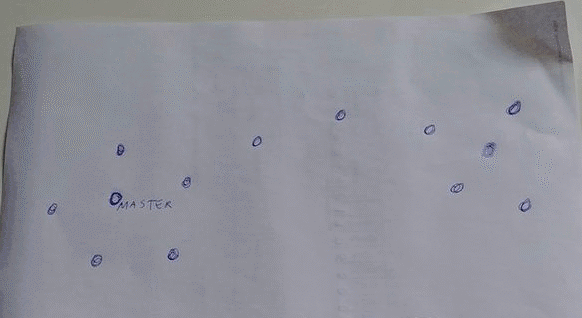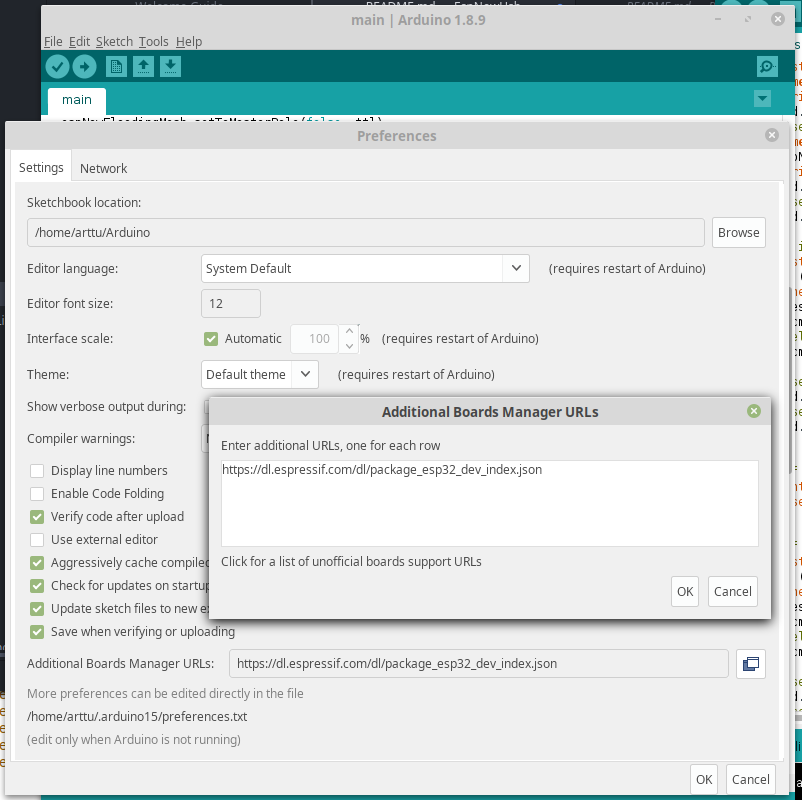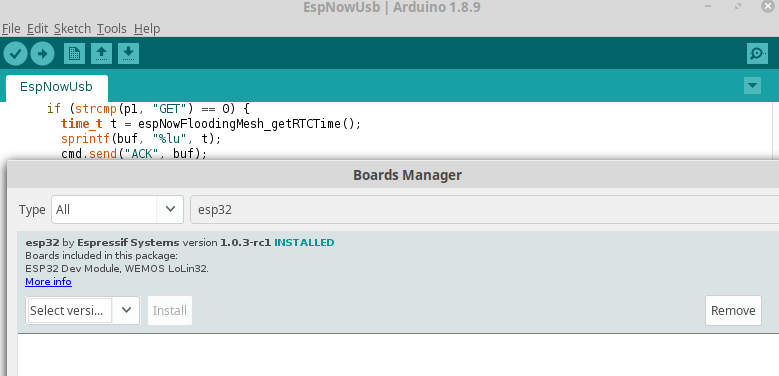Includes:
- Mesh usb adapter codes (for esp32/esp2866).
- Mesh gateway codes (Convert messages between mesh network and MQTT broker)
- Slave node example codes (Slave node can read sensors, control switches/lights or something else)
- Works on EspNow broadcast
- Nearly instant connection after poweron
- Maximum number of slave nodes: unlimited
- Flooding mesh support
- a message cache. If a received packet is already found in the cache --> it will not be retransmitted or handled again
- Mesh nodes use MQTT service (subscribe/publish)
- Master node (USBAdapter=ESP32 or ESP2866) is connected to RaspberryPi's USB port
- Each Nodes can communicate with each other
- ESP32, ESP2866, ESP01
- Ping about 40-60ms
- ttl support
- Battery node support
- AES128
- Retransmission support
- Request/Reply support
- Send and pray support (Send a message to all nodes without reply/ack)
- Easy to configure (just set channel, secure keys and bsid)
- Simple mqqt interface. All nodes can use mqtt services via master node (subsribe,unsubscribe,publish,get).
- MQTT local cache on raspberry
- Arduino
____________________________________
( )
| |
( Internet )
| |
(____________________________________)
^
|MQTT
|
+--------------------|-------+
| RaspberryPi V |
|-------------+ +--+-------|
| MeshGateway |<->| MQTT | +-------------------------------------+
| | | broker | | ESPNOW mesh network |
+-----+-------+---+----------+ | Node6 |
^ | Node1 Node3 |
| USB(SerialData) | +------------+ Node3 Node5 |
+------------------------------>| USBAdapter | Node4 |
| | (Master) | NodeX Node7 |
| +------------+ |
+-------------------------------------+
In this network example ttl must be >= 5
SlaveNode
|
| Message from master to BatteryNode
| ---------------------------+
| ttl=5 ttl=4 |
SlaveNode-------MasterNode-------------SlaveNode |
| | |
| | |
| | |
| | |
SlaveNode | |
| | |
| | |
| | +------------------------------------------------>
| | ttl=3 ttl=2 ttl=1
SlaveNode-------SlaveNode-------------SlaveNode-------SlaveNode-------------SlaveNode---------BatteryNode
| | |
| | |
| | |
| | |
+-----------SlaveNode-----------------+
The Master sends a request to the farthest node and the farthest node replies.

- https://github.com/arttupii/espNowFloodingMeshLibrary
- https://github.com/arttupii/ArduinoCommands
- https://github.com/arttupii/SimpleMqttLibrary
- https://github.com/kakopappa/arduino-esp8266-aes-lib (Only ESP2866)
- PIR-sensor node: https://github.com/arttupii/PirSensorNode
- Relay switch node: https://github.com/arttupii/mesh-relay
- Temperature sensor node: https://github.com/arttupii/mesh-dallas
- Four channel relay (+reed switch) node: https://github.com/arttupii/FourChannelRelay
- Esp32/Esp2866/Esp-01
- https://github.com/arttupii/EspNowUsb/tree/master/arduinoSlaveNode/main
- https://github.com/arttupii/EspNowFloodingMesh/tree/master/gateway
- See config.js file (https://github.com/arttupii/EspNowUsb/blob/master/RaspberryPiServer/config.js)
- Install Arduino and following dependencies:
- https://github.com/arttupii/espNowFloodingMeshLibrary
- https://github.com/arttupii/ArduinoCommands
- https://github.com/arttupii/SimpleMqttLibrary
- https://github.com/kakopappa/arduino-esp8266-aes-lib (Only ESP2866)
- Install esp8266 dev module. Use git version.
- Instructions: https://github.com/esp8266/Arduino
- Check Espressif FW version!!!. It should be nonos-sdk 2.2.1+100(testing).

- Add "https://dl.espressif.com/dl/package_esp32_dev_index.json" into the Additional Board Manager URLs field.

- Install esp32 dev module 1.0.3-rc1 from Arduino's Boards Manager.

- Flash Usb adapter software (EspNowUsb/EspNowUsb.ino) on esp32/esp2866 (esp32 is the best choice.). (You don't need to change any parameters)
- Install mqtt broker, nodejs and npm on RaspberryPi
curl -sL https://deb.nodesource.com/setup_12.x | sudo -E bash -
sudo apt-get install mosquitto nodejs npm
- Get gateway and install npm modules
git clone git@github.com:arttupii/EspNowFloodingMesh.git
cd EspNowFloodingMesh
cd gateway
npm install
- Modify gateway/config.js file:
- set secredKey parameter (16 bytes)
- set initializationVector parameter (16 bytes).
- set bsid
- Start gateway software on RaspberryPi. .
a@labra:~/git/EspNowUsb/gateway/node index.js
begin /dev/ttyUSB0 115200
Subscribe topic device1/led/value from cache
Subscribe topic device1/led/set from cache
reboot
Role MASTER, ttl=3
MAC GET
InitializationVector [178,75,242,247,122,197,236,12,94,31,77,193,174,70,94,117]
key [0,17,34,51,68,85,102,119,136,153,170,187,204,221,238,255]
Channel 1;
Init
RTC 1563876153
- Open slave node code (arduinoSlaveNode/main/main.ino) and modify deviceName, secredKey, iv and ESP_NOW_CHANNEL paramaters.
- https://github.com/arttupii/EspNowFloodingMesh/tree/master/arduinoSlaveNode/main
- deviceName should be unique
- secredKey, iv, bsid and ESP_NOW_CHANNEL must be match to config.js file on raspberryPi. Otherwise mesh network won't work. --> Flash slave node
Slave node updates the button's state to topic device1/switch/led/value. The led state can be controlled with topic device1/switch/led/set on/off.
#include <EspNowFloodingMesh.h>
#include<SimpleMqtt.h>
/********NODE SETUP********/
#define ESP_NOW_CHANNEL 1
const char deviceName[] = "device1";
unsigned char secredKey[16] = {0x00, 0x11, 0x22, 0x33, 0x44, 0x55, 0x66, 0x77, 0x88, 0x99, 0xAA, 0xBB, 0xCC, 0xDD, 0xEE, 0xFF};
unsigned char iv[16] = {0xb2, 0x4b, 0xf2, 0xf7, 0x7a, 0xc5, 0xec, 0x0c, 0x5e, 0x1f, 0x4d, 0xc1, 0xae, 0x46, 0x5e, 0x75};
const int ttl = 3;
const int bsid = 0x112233;
/*****************************/
#define LED 1
#define BUTTON_PIN 2
SimpleMQTT simpleMqtt = SimpleMQTT(ttl, deviceName);
bool setLed;
bool ledValue;
void setup() {
Serial.begin(115200);
pinMode(LED, OUTPUT);
pinMode(BUTTON_PIN, INPUT_PULLUP);
espNowFloodingMesh_secredkey(secredKey);
espNowFloodingMesh_setAesInitializationVector(iv);
espNowFloodingMesh_setToMasterRole(false, ttl);
espNowFloodingMesh_begin(ESP_NOW_CHANNEL, bsid);
espNowFloodingMesh_ErrorDebugCB([](int level, const char *str) {
Serial.print(level); Serial.println(str); //If you want print some debug prints
});
if (!espNowFloodingMesh_syncWithMasterAndWait()) {
//Sync failed??? No connection to master????
Serial.println("No connection to master!!! Reboot");
ESP.restart();
}
//Handle MQTT events from master. Do not call publish() inside of call back. --> Endless event loop and crash
simpleMqtt.handleEvents([](const char *topic, const char* value) {
simpleMqtt._ifSwitch(VALUE, "led", [](MQTT_switch value){ //<--> Listening topic switch/led/value/value
if(value==SWITCH_ON) {
ledValue = true;
}
if(value==SWITCH_OFF) {
ledValue = false;
}
});
simpleMqtt._ifSwitch(SET, "led", [](MQTT_switch set){ //<-->Listening topic device1/switch/led/set
if(set==SWITCH_ON) {
setLed = true;
}
if(set==SWITCH_OFF) {
setLed = false;
}
});
});
if (!simpleMqtt._switch(SUBSCRIBE, "led")) { //Subscribe topic device1/switch/led/set and get topic device1/switch/led/value from cache
Serial.println("MQTT operation failed. No connection to gateway");
}
}
bool buttonStatechange = false;
void loop() {
espNowFloodingMesh_loop();
int p = digitalRead(BUTTON_PIN);
if (p == HIGH && buttonStatechange == false) {
buttonStatechange = true;
setLed = true;
}
if (p == LOW && buttonStatechange == true) {
buttonStatechange = false;
setLed = false;
}
if (ledValue == true && setLed == false) {
ledValue = false;
Serial.println("LED_OFF");
//digitalWrite(LED,HIGH);
if (!simpleMqtt._switch(PUBLISH, "led", SWITCH_OFF)) { //publish topic device1/switch/led/value off
Serial.println("Publish failed... Reboot");
Serial.println(ESP.getFreeHeap());
ESP.restart();
}
}
if (ledValue == false && setLed == true) {
ledValue = true;
Serial.println("LED_ON");
if (!simpleMqtt._switch(PUBLISH, "led", SWITCH_ON)) { //publish topic device1/switch/led/value on
Serial.println("Publish failed... Reboot");
Serial.println(ESP.getFreeHeap());
ESP.restart();
}
}
delay(100);
}module.exports = {
"usbPort": "/dev/ttyUSB0",
"mesh": {
"secredKey": [0x00, 0x11, 0x22, 0x33, 0x44, 0x55, 0x66, 0x77, 0x88, 0x99, 0xAA, 0xBB, 0xCC, 0xDD, 0xEE, 0xFF],
"ttl": 3,
"channel": 1
},
"dbCacheFile":"./cache.json",
"mqtt": {
"host": "mqtt://localhost",
"root": "mesh/"
}
}[nodename]/[type]/[sensorOrSwitchName]/[value or set] value
***SWITCH***
device1/switch/lamp1/value on
device1/switch/lamp1/value off <--Current lamp state (only node should change this!)
device1/switch/lamp1/set on <--Request set lamp on from outside
device1/switch/lamp1/set off <--Request set lamp off from outside
device1/switch/alarm/value off <--Current lamp state (only node should change this!)
device1/switch/alarm/value on <--Current lamp state (only node should change this!)
device1/switch/alarm/set on <--Request set lamp on from outside
***TEMPERATURE SENSORS***
device1/temp/outside/value 24.8 <--Celsius
device1/humidity/bedroom/value 55 <--percentage
device1/temp/thermostat1/set 21.2 <--Set thermostat
***TRIGGER***
device1/trigger/pirSensor1/value "triggered" <--Trigger to outside. For example pulse from pir-sensor.
***CONTACT***
device1/contact/switch1/value open
device1/contact/switch1/value closed
***DIMMER***
device1/dimmer/myDimmer1/value 0 <--min value==off
device1/dimmer/myDimmer1/value 255 <--max value==on
device1/dimmer/myDimmer1/set 0 <--min value==off
device1/dimmer/myDimmer1/set 255 <--max value==on
***STRING***
device1/string/message/value HelloWorld! <--(only node should change this!)
device1/string/screen/set HelloWorld! <--(short string message from outside)
***NUMBER***
device1/number/thing/value min,max,step <--(number message to outside)
device1/number/thing/set min,max,step <--(number message from outside)
***FLOAT***
device1/float/thing1/value 343.23 <--(number message to outside)
device1/float/thing1/set 123.32 <--(number message from outside)
***INT***
device1/int/thing1/value 123 <--(int message to outside)
device1/int/thing1/set 456 <--(int message from outside)
***ROLLERSHUTTER***
device1/shutter/myrollershutter/set open
device1/shutter/myrollershutter/set close
device1/shutter/myrollershutter/set stop
device1/shutter/myrollershutter/value open
device1/shutter/myrollershutter/value close
device1/shutter/myrollershutter/value stop
***Counter***
device1/counter/gasMeter/value 23412343252 <--(gasMeter value to outside)
device1/counter/gasMeter/value 23412343252 <--(gasMeter value to outside)
***Binary***
device1/bin/data1/value dGVzdA== <--(Binary data base64)
device1/bin/data/set dGVzdA== <--(Binary data base64)